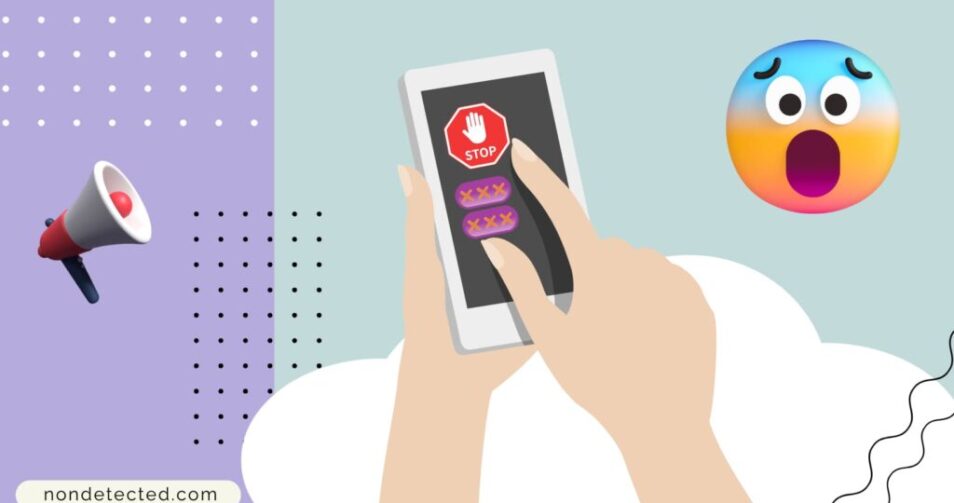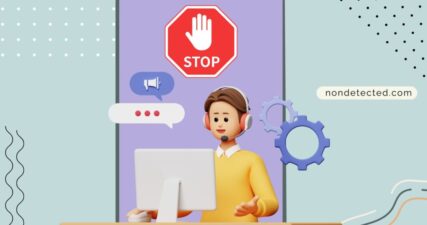What Is Sextortion and Why Should You Be Concerned?

Let’s talk about something important yet often overlooked: sextortion. As someone who’s been in the trenches of online reputation management at NonDetected, I’ve seen how this issue is growing and, frankly, it’s something we all need to be aware of.
So, what’s sextortion? Imagine someone using your private, intimate photos or videos against you, demanding money or more compromising content. It’s like blackmail, but with a digital twist compared with notes of sensitive material.
And it’s not just celebrities or public figures who are targets; it can happen to anyone – teens, adults, anyone using the internet.
Why am I writing this? Because I’ve seen the damage sextortion can do – it’s not just about losing money or feeling embarrassed. It can really shake you up emotionally and mentally. And with our lives being so digital these days, it’s a threat that’s becoming more common.
This article is for everyone – whether you’re just curious, worried about your online safety, or, unfortunately, if you’ve been a victim of sextortion.
I am going to cover what it is, real-life examples, legal stuff, and most importantly, what you can do about it. Knowledge is power here, and I’m here to share that with you. So, no more intro words, let’s get started.
What Does Sextortion Look Like in Real Life?
Sextortion, a form of sexual extortion, is an online threat that’s becoming increasingly common. Sexual extortion involves coercion, often for money, access to a bank account or sending more sexual images.
We previously talked about sharing documents for manipulation, which is also called doxxing, same thing here – sextortion is not just about the sharing of explicit photos or videos; it’s the threat and manipulation that define sextortion.
Alright, let’s dive into what sextortion actually looks like in the real world. It’s one thing to know the definition, but understanding how it plays out can really open your eyes to what’s going on out there.
The Nature and Impact of Sextortion
Sextortion is like someone holding your digital privacy hostage. It usually starts innocently – maybe a conversation on a dating app or a social media message.
But then, it turns sour. You share something private, thinking it’s just between you and the other person, and bam – they turn around and demand money, more explicit photos, or even sexual favors.
If you don’t comply, they threaten to release your private sexual images or explicit videos to the world.
Main Types of Sexual Extortion
There are a couple of main types here:
- Financial Sextortion – this is where the perpetrator wants money. They might say, “Pay up, or your nude photo goes public.”
- Sexual Favors Sextortion – here, they might demand more sexual images or acts, using what they already have as leverage.
Sextortion vs. Porn Revenge
Now, sexual extortion is different from porn revenge. Porn revenge is when someone – often an ex-partner from romantic relationship – shares intimate content without your consent, usually to embarrass you. Sextortion, on the other hand, is all about control and demands.
It’s more like, “Do this, or I’ll share your photos,” rather than just sharing them out of spite.
Real-Life Examples of Sextortion Victims

To give you a clearer picture, here are a couple of sextortion cases from my experience, that we used to help with the leaked information removal:
The Online Gamer
A young guy, passionate about online gaming, accepts a friend request from a stranger. They start chatting, and the conversation takes a flirty turn. He shares a nude photo, only to get online threats and be blackmailed for online game credits to keep the photo under wraps.
The Dating App Nightmare
A woman connects with someone on a dating app. They seem to click, and their conversation moves to private messaging. She shares an intimate video, trusting him, but he soon demands money, threatening to share the video with her family and on the internet.
The Social Media Influencer
An up-and-coming social media influencer receives a message from a new follower, complimenting her on her posts. They start a friendly exchange, and she’s persuaded to send a personal photo. The follower then turns into an extortionist, demanding a large sum of money to prevent the photo from going public.
The Remote Worker’s Risk
A man working remotely receives an email, seemingly from a colleague, with a link to what appears to be a work document. He clicks it, unknowingly enabling malware that gives the sender access to his personal photos, and lucky for blackmailer but sadly for the victim, there is one folder with images of sexual acts. He’s soon contacted with a demand for money in exchange for not leaking these nude photos to his employer and colleagues.
The Deepfake Porn Dilemma
A woman, active on social media, unknowingly becomes the target of an AI expert using her publicly available photos. With advanced deepfake technology, they create highly realistic but completely AI generated explicit videos featuring her likeness. She’s horrified to discover these videos circulating online, receiving threats that they’ll be sent to her family and employer unless she pays a hefty sum. This nightmare scenario showcases the dangerous potential of deepfake porn, highlighting the urgent need for awareness and protective measures.
The College Student’s Dilemma
A college student, active on social media, gets a message from someone claiming to be a fellow student. They start chatting, and she’s coaxed into sharing a suggestive photo. The person then reveals their true intentions, threatening to share the photo with her university peers unless she pays them.
These stories are just the tip of the iceberg. Sextortion can happen in so many ways, and it’s not always about money. Sometimes it’s about power, control, or just causing harm.
But the bottom line is, it’s a serious violation of trust and privacy, and it can leave lasting scars.
Are There Legal Protections Against Sextortion?
Now, let’s talk about the legal side of things. If you’re caught in a sextortion trap, it’s not just a personal crisis; there are laws out there to protect you.
Let’s break it down by regions because the legal landscape can vary quite a bit.
In the United States
In the U.S., sexual extortion is taken seriously. It’s considered a form of blackmail or extortion, and it’s definitely illegal. The specific laws can vary from state to state, but at the federal level, it’s a criminal offense.
If you’re in this situation, you can reach out to your local FBI field office. They deal with online crimes like this all the time.
How to Use These Laws?
If you’re a victim, gather any evidence you have – messages, emails, screenshots – and report sextortion. Law enforcement can take it from there. They’re trained to handle these sensitive situations discreetly and professionally.
In the European Union
Over in the EU, they’re pretty strict about digital privacy and rights. Sextortion falls under these laws, so you’ve got a legal leg to stand on.
Each country in the EU has its own way of handling it, but generally, it’s recognized as a criminal act.
Using EU Laws
Just like in the U.S., collect any evidence and report it to your local authorities. In the EU, there’s also a strong focus on victim support, so you’ll likely find additional resources to help you through the process.
Other Countries
Globally, awareness of sextortion is growing, and more countries are starting to put laws in place. It’s a bit of a mixed bag, though. Some places have clear laws against it, while others are still catching up.
If you’re not in the U.S. or EU, it’s worth doing a quick search to see what your country’s stance is. And no matter where you are, reporting it is key. Even if the laws aren’t fully there yet, making a report can help push for change.
No matter where you are, the first step is always to report it. Law enforcement can guide you on the specifics in your area.
The most important is to remember that sexual extortion is a CRIME, and you have rights. The law is there to protect you, so don’t hesitate to use it.
What Immediate Steps Should Victims of Sextortion Take?

If you find yourself a target of sextortion, it’s crucial to act fast and smart.
Here’s a breakdown of what you can do, both to prevent sexual extortion and to handle it if it’s already happening to you.
5 Steps to Prevent Sextortion
- Don’t share personal details or intimate content with people you don’t trust. This includes on dating apps, social media, and even emails.
- Regularly update your privacy settings on social media. Make sure you know who can see your posts and personal information.
- Know the signs of sextortion and talk about it with friends and family. Awareness is a powerful tool.
- Use strong, unique passwords for your online accounts and consider two-factor authentication for an extra layer of security.
- If someone you’ve just met online (or even someone you know) starts asking for intimate photos or videos, be wary. It could be a setup for sextortion.
If you are a sextortion victim, do not blame yourself. Victims shame will not work here, and surely won’t help you, keep in mind that you are not alone, and there are still many options for you to do.
5 Steps to Take If You’re Already a Victim
- Paying the extortionist doesn’t guarantee they’ll delete your content. In fact, it might encourage them to demand more.
- Keep a record of all communications with the extortionist. This can be crucial evidence if you decide to report the crime.
- Stop communicating with the person trying to extort you. Continuing the conversation can often make things worse.
- Reach out to a trusted friend, family member, or a professional for support. Dealing with sexual extortion can be emotionally taxing.
- Contact your local law enforcement or a cybercrime unit. They can guide you on the next steps and help stop the perpetrator.
Always, ALWAYS, remember, sextortion is a crime, and it’s not your fault. These steps can help you regain control of the situation and protect yourself from further harm that can be done.
Can Online Images or Videos Be Removed After Sextortion?
If you’re dealing with the aftermath of sextortion and worried about sensitive images or videos of you floating around online, there’s a practical solution.
At NonDetected, we’re equipped to help remove this content and make sure it doesn’t keep popping up elsewhere on the Internet.
How NonDetected Works with Content Removal?
Just so you know how the process of sextortion victims help work at our company, below I’m sharing details.
1. Locating the Content
The primary step is finding where your images or videos have ended up after the leak. It is not as easy as to find the video in YouTube, this could be anywhere from social media platforms to less mainstream websites. We use various advanced tools and techniques to track down this content across the web.
2. Efficient Removal Process
Once we’ve identified where the content is, we get to work on getting it removed. We have experience dealing with various websites and platforms, understanding the best approaches to expedite the removal process.
3. Ongoing Monitoring
An important part of our service is ongoing vigilance. If the same content resurfaces or appears on other sites, we’re on it. Our goal is to ensure that once something is removed, it stays gone.
(*this option is working only after the client’s request).
4. Expert Support
We’re here to guide you through every step of this process. We understand how sensitive and stressful these situations can be, and we offer our expertise and support to make it as stress-free as possible.
Let’s Take Action Together
If you’re facing the challenge of having private or explicit content shared without your consent, never forget you’re not alone in this. Reach out to us at NonDetected.
We’re committed to helping you clean up your online presence and ensuring that all traces of unwanted content are removed.
Together, we can work towards restoring your peace of mind and securing your digital life.
How Can You Prevent Future Sextortion Attacks?
Preventing future sextortion attacks is all about being proactive and smart with your digital life. Yes, this is an active process, not a passive waiting.
Here are some strategies that can help you stay safe and reduce the risk of falling victim to sexual extortion again.
Strategies for Digital Safety
- Regularly review and tighten your privacy settings on all social media and online platforms. Be selective about who you add or connect with, especially if you don’t know them personally.
- It’s crucial to be cautious about what you share online. Intimate or personal content can be used against you, so think carefully before sending anything that could be compromising.
- Sextortion often starts with a scam. Familiarize yourself with common online scams and the tactics used by sextortionists. This knowledge can be your first line of defense.
- Ensure all your online accounts are secured with strong, unique passwords. Consider using a password manager to keep track of them. This helps prevent unauthorized access to your accounts where sensitive information might be stored.
- Wherever possible, enable two-factor authentication (2FA) for an added layer of security. This makes it harder for someone to gain access to your accounts, even if they have your password.
- If you receive messages or emails from people you don’t know, especially if they’re asking for personal information or photos, be cautious. It’s better to err on the side of caution and not engage.
- Regularly update your computer and smartphone software, including security programs. This helps protect against vulnerabilities that could be exploited by hackers.
- Don’t be afraid to talk about the risks of sextortion with friends and family. Raising awareness can help others be more cautious and prevent them from becoming victims.
Using these strategies, you can significantly reduce the risk of becoming a target of sextortion.
Keep in mind, your online safety is in your hands, and taking these proactive steps can help you maintain control over your digital life, online activity, and, of course – digital footprints.
Conclusion
If you’re facing sextortion, it’s not a reflection of your character or choices. It’s a crime committed against you, and there’s support available. Legal avenues exist to help you, and specialized services like NonDetected are here to assist in removing unwanted content from the web.
Most importantly, know that you’re not alone in this. Many have faced this challenge and found a way through it, emerging more robust and aware.
Sexual extortion is a serious issue, but with the proper knowledge and support, it’s one that we can confront and overcome. Let’s continue to build a digital environment where respect and safety are the norms, not the exceptions.


